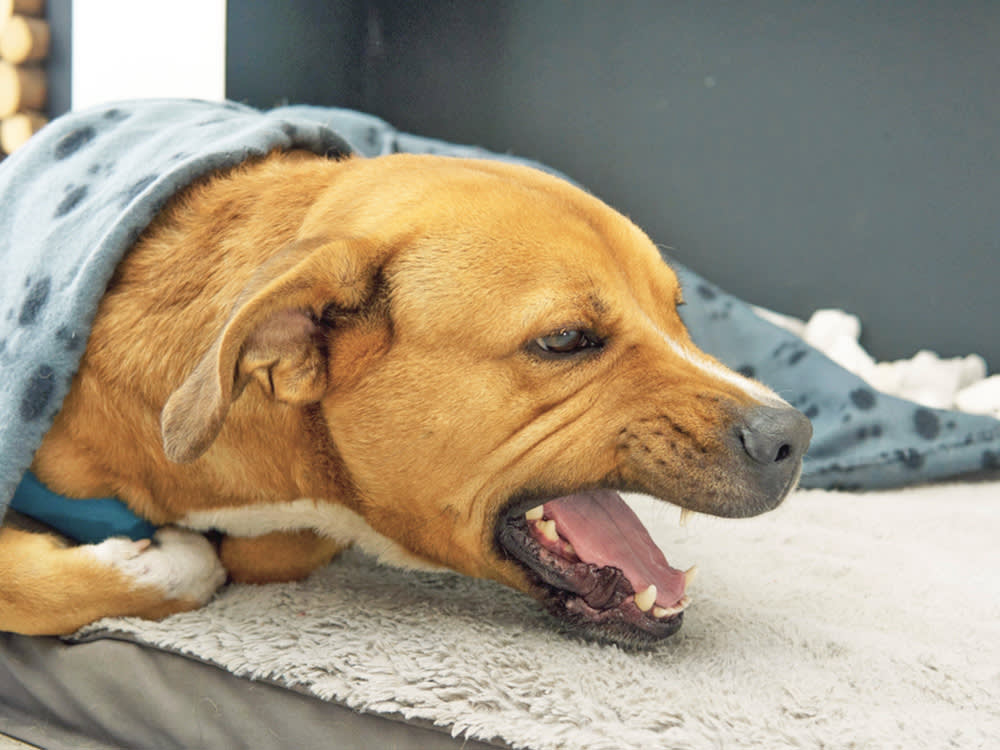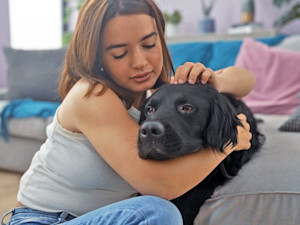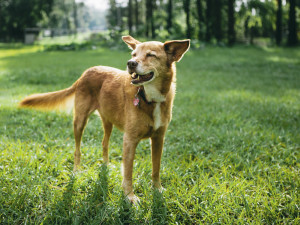Why Is My Dog Coughing? 11 Reasons Why and What to Do
From toxins to allergies, let’s get down to business and problem-solve this.
In This Article:
Common Reasons for Coughing in Dogs Types of Dog Coughs Symptoms Associated With Dog Coughing What to Do if My Dog Is Coughing? What if My Dog’s Cough Is Mild? How Do Vets Treat Coughing in Dogs? Medications for Coughing Dogs Follow-up Care and the Recovery After Treatment
Coughing — arguably one of your least favorite sounds as a dog parent — is a common symptom in dogs, but it’s important to know when to be concerned. The causes of your dog’s coughing range from very mild reasons to very severe ones.
If your dog’s cough is persistent or accompanied by other symptoms (such as lethargy, loss of appetite, or fever), it’s important to seek veterinary care. Other concerning signs that require professional care include coughing up blood, mucus, or foam, or if your dog’s cough worsens at night or any time they’re resting.
Common reasons for coughing in dogs
Dogs cough to expel material from their airways, whether it’s due to an irritant or from congestion. A true cough is a forceful action that pushes air and other particles from the respiratory tract. Below are some of the many causes a dog will cough.
How much do you spend on your pet per year?
1. Respiratory infections
Like humans, pets can catch respiratory infections pretty easily, especially if they’re playing with other pets at dog parks, doggie daycare, or other crowded areas. Infections are spread through respiratory droplets that are kind of hard to avoid when wrestling and sharing toys or water bowls. If you work with dogs, you could even carry a virus or bacteria home on your clothes.
Coughing and respiratory infections in dogs often go hand in hand as these issues can lead to plenty of irritation to a dog’s airways. Respiratory infections can stem from many different illnesses.
Kennel cough: This contagious illness happens most commonly when dogs are in close confines like during boarding, while they’re being groomed, or in obedience classes. Kennel cough has a variety of different viral and bacterial causes and usually creates a persistent dry cough that will often get better with time, though treatment will ensure your dog’s cough doesn’t spread.
Canine influenza: Similar to other flu viruses, this one can leave a dog coughing and sneezing, with nasal discharge. They may also have a fever and not want to eat.
Other viruses and bacteria: Signs of these infections run the gamut depending on which nasty bug it is. But expect some coughing, sneezing, and loss of appetite.
Cold or an unknown illness: Dogs can even cough due to mild illnesses like a cold or a not-so-common illness that we don’t completely understand.
2. Pneumonia
Lungs are soft, spongy, and literally filled with air. This is necessary for providing oxygen to all the tissues of the body. Some illnesses can cause parts of the lungs to fill with fluid. Pneumonia, or fluid in the lungs, can create a cough and make it difficult for a dog to breathe. Pneumonia is a serious issue that can progress very quickly, even becoming fatal. If your dog has a persistent cough that just isn’t getting better, see your vet before other signs (such as difficulty breathing, fever, or lethargy) start up.
3. Allergies
All that pollen in the air gets to your dog, too. Allergies are one of the most common medical concerns in dogs, although most will struggle with itching and scratching rather than upper respiratory symptoms. Still, allergens can sometimes affect your pet’s airways and lead to coughing, sneezing, wheezing, panting, and discharge from their eyes and nose. Not the cutest look.
There’s not much you can do to prevent respiratory reactions to allergens, but in serious cases, you can discuss treatment with antihistamines or corticosteroids with your vet. But don’t ignore your dog’s symptoms, because that can lead to bronchitis and sinusitis.
4. Heartworm
Heartworm disease is exactly what it sounds like: Worms infest a dog’s heart and the vessels leading to the lungs, blocking arteries and potentially damaging both organs in the process. Heartworms are spread via mosquito bites, where tiny larvae move into the dog’s bloodstream and eventually grow into adult worms within their heart, releasing even more larvae.
Dogs can be treated for heartworm disease, but it isn’t pleasant. Instead, it’s best to prevent heartworm through year-round medications that, as a bonus, may also work on other internal worms. If left untreated, heartworm can be fatal.
5. Congestive heart failure
Unfortunately, not all heart problems are preventable. Some dogs are born with them, and others develop them as they age. Either way, most of these issues result in the heart not working as it should, leading to classic signs such as tiring easily, pacing restlessly, and breathing rapidly — especially after exercise or when trying to sleep.
Coughing is usually only seen in cases of severe congestive heart failureopens in new tab, as the reduced strength of the heart causes fluid to back up into the lungs. Less common but more advanced symptoms include fainting, weight loss, a swollen belly, and a change in your dog’s tongue or gum color owing to poor oxygen flow.
Depending on your dog’s heart condition, your vet may prescribe medication that can correct irregular heartbeats, slow fluid build-up in the lungs, or help increase blood flow (don’t be confused if they prescribe Viagra). Some dogs are even candidates for surgery to install a pacemaker. In general, keeping your dog at a healthy weight and activity level can ease the strain on their heart.
6. Tracheal collapse
If you can picture a small-breed dog excitedly barking at the door followed by an episode of coughing that sounds like geese flying overhead, you’re likely witnessing tracheal collapse in dogs. This occurs when the stiff cartilaginous rings that keep the trachea firm degrade and collapse on themselves, narrowing the airway as a dog breathes in.
This can create inflammation which can lead to coughing. When severe, tracheal collapse can cause difficulty breathing and even fainting. It’s most often treated through medication, though surgery may be an option for some dogs.
7. Cancer
Not to sound like a scary medical article, in which all roads lead back to cancer — but yeah, coughing can be a sign of lung cancer in dogs. The good news is that it’s quite rare, though certain breeds seem to be more prone to it than others, including Boxers, Doberman Pinschers, Australian Shepherds, Irish Setters, and Bernese Mountain Dogs.
Lung cancer in animals may be linkedopens in new tab to the inhalation of cigarette smoke, so avoid exposing your dog to secondhand smoke. Cancers in the lungs can start there (primary tumors) or spread from other organs (metastatic tumors). About one-third of these dogs are not symptomatic, and tumors are often discovered incidentally by chest X-rays, then confirmed via biopsy or other methods. Depending on the diagnosis, a veterinary oncologist may recommend surgery, radiation, and/or chemotherapy.
8. Chronic bronchitis
Chronic bronchitis causes increased mucus secretion and thickening of the lungs’ airway walls. It can be triggered by inhaled particles (such as smoke or allergens) and may have a genetic component. Small-breed dogs like Yorkies, Chihuahuas, Pomeranians, and Toy Poodles are among the most commonly affected. Dogs of any age can have chronic bronchitis, though it does seem to get more common and severe with age.
Chronic bronchitis can lead to changes in the lungs that worsen with time. Some of the lungs’ normal, self-cleaning functions become impaired, leading to infections. The airways can weaken and begin to collapse with time, leading to difficulty breathing, with dogs needing to put a lot of extra effort into exhaling fully.
Chronic bronchitis isn’t curable. However, it can be controlled with bronchodilators, steroids (often given by an inhaleropens in new tab, like human asthma medications), and maintenance of an appropriate body weight.
9. Foreign object
Dogs can be like children when it comes to putting things in their mouths — and let’s just say that some things shouldn’t be eaten for a reason. Foreign objects of the right size can lodge in a dog’s throat, potentially blocking an airway. The object, or even just the irritation left from one, can cause a dog to cough or hack to try to get it out.
Dogs may also paw at their mouths or have difficulty breathing if they are choking. This is considered an emergency, so see a vet as soon as possible.
10. Toxins
Unfortunately, not everything in your dog’s world is friendly and safe — and they don’t always leave those unsafe things alone. Ingesting or inhaling a toxic substance can cause coughing, either by irritating the respiratory system the way an allergen would or by causing fluid accumulation in the chest similar to heart failure. If you suspect your dog has come in contact with a toxin of any kind, see your veterinarian immediately.
11. Obesity
Obesity in our pets is a problem in the U.S. Around 60 percent of dogs are considered overweight or obeseopens in new tab, and this number keeps rising. Carrying around extra weight makes everything harder on your dog’s body. Joints, muscles, bones, and organs can all be affected. Obesity can even increase a dog’s risk of coughing, especially during or after exercise.
Keeping your dog at a vet-recommended weight benefits them in so many ways besides just helping prevent a cough. So speak to your vet if your dog could stand to lose a few pounds.
Types of dog coughs and how to identify them
A cough may sound like just a cough to you, but your veterinarian is going to want to dig deeper, dissecting your dog’s cough to better learn where it’s coming from. You can also determine at home which type of cough your dog has.
Dry cough
A dry cough sounds like a dog trying to clear their throat. It may be hacking as it usually has something to do with irritation of the throat. There may be some foam or mucus that makes an appearance. Dry coughs are what you’ll see with kennel cough and bronchial issues.
Wet cough
If a dry cough makes a hacking sound, then a wet cough can be described as a gurgling sound. (You can literally hear the fluid sloshing around in there.) You may also hear a rattle or a wheeze. Wet coughs usually point to something more serious, such as heartworm, pneumonia, or heart failure, so see your vet as soon as possible. A wet cough with a gag that follows, also known as terminal retch, can be a red flag for heart failure, so if you hear this, call your vet immediately.
Honking cough
A honking cough is the onomatopoeia of the coughing world. It sounds like its name, and may also be called a goose-honking cough because it sounds like a flock of geese overhead. Honking coughs are most often heard with tracheal collapse.
Persistent cough
Regardless of the sound, your vet will also be interested in the frequency of your dog’s cough. Intermittent coughing happens every once in a while, while a persistent cough goes on and on. This doesn’t mean that your dog is engaged in a never-ending coughing fit, just that their cough hangs on for days or even weeks.
Night cough
This is a cough that’s worse at night or when a dog lies down. Congestive heart failure is famous for a night cough because lying down adds extra pressure to the chest, which makes it even harder for a dog’s fluid-filled lungs to work.
Symptoms associated with dog coughing
A cough may not be your dog’s only sign. Be on the lookout for other related issues (which may include sneezing, nasal discharge, difficulty breathing, a fever, lethargy, or not eating) that indicate any kind of respiratory infection.
If your dog has eaten something they shouldn’t have, they may drool or paw at their mouth while coughing. They may also experience difficulty breathing, have pale gums, and exhibit lethargy. You may likewise notice they don’t want to exercise or tire quickly.
What should I do if my dog is coughing?
It’s always hard to know how concerned to be when your dog is coughing. This will often depend on the context. If your dog has a coughing fit after drinking a bunch of water but is acting fine otherwise, it’s generally not a cause for concern. If you notice chronic, severe, or unexplained coughing, have your dog checked out by your veterinarian. Whether acute or persistent, dog coughing symptoms should raise red flags if accompanied by other signs such as:
Lethargy
Weakness
Fever
Discharge from the eyes or nose
Loss of appetite
Production of blood or mucus during episodes
When a dog’s coughing is an emergency
Any time your dog is experiencing the following signs, consider it an emergency:
Pale or bluish gums
Rattling or wheezing sounds when breathing
What if my dog’s cough is mild?
An acute, mild cough once or twice a day that isn’t bothering your dog, or interfering with their normal doggy business, isn’t a reason to rush your pup to the vet. Call your vet’s office or set up an appointment if that cough stays persistent, changes in sound or character, or becomes more frequent. It’s always better to get things checked out early to make sure that a minor problem doesn’t become a major one.
How do vets treat coughing in dogs?
A full history is important to figure out the cause of a cough. Your vet will want to know how long it’s been going on, what it sounds like, and which other symptoms are accompanying the cough. Dogs don’t always want to cough for the vet, so it’s helpful if you can record a coughing episode for your vet to see and hear.
After examining your dog and listening to their lungs, your vet may want to take chest radiographs to see if there’s evidence of pneumonia, bronchitis, cancer, or other issues within the lungs. The type of treatment will depend on the sound of the cough, the presence of different lung sounds, the presence of a fever, and changes seen on radiographs.
Which medication is available for coughing in dogs?
No cough medicine is a cure-all. The type of medication or therapy used for a cough will be determined by its cause. Here are some common types of medications used.
Cough suppressants: Some coughs just need time to resolve, and cough suppressants can help keep your dog comfortable during that time. Some causes for coughing (such as pneumonia) can be worsened by getting rid of the cough reflex, so your vet will prescribe a suppressant only when it’s safe. Don’t use over-the-counter cough medications unless specifically advised by your vet — some contain ingredients that are very dangerous for dogs.
Corticosteroids: These drugs help reduce inflammation, but do so by suppressing the immune system. If they’re needed chronically, switching to an inhaled steroid can reduce side effects and focus treatment on the airways only. Steroids can be great for tracheal collapseopens in new tab or chronic bronchitis, when there’s unwanted inflammation. But they can be dangerous when there’s the possibility of an infection.
Bronchodilators: Bronchodilators help open the airways of dogs with conditions where the airway muscles spasm. They are most commonly used for dogs who have chronic bronchitis but are sometimes used for other conditions.
Heart medications: In congestive heart failure, vets frequently use a combination of drugs to clear fluid out of the lungs, make the heart pump more efficiently, and reduce stress on the heart. These medications are usually needed for life due to the progressive nature of heart disease.
Antibiotics: This is the go-to treatment for kennel cough and pneumonia.
What are the steps involved in follow-up care, and the recovery process for dogs after treatment?
Vets will often advise avoiding excitement in the short term to reduce the load on the lungs. Dogs with contagious coughs (such as kennel cough) should be kept isolated from other dogs for at least two weeks after recovery to prevent the spread of the disease.
Preventive care for a dog’s cough is limited. Keeping up with routine veterinary care is key to recognizing problems including heart disease, tracheal collapse, and bronchitis before they begin causing serious issues. Vaccination and monthly preventatives help reduce the likelihood of contagious problems, such as kennel cough and heartworm disease. When out in public, keep your dog away from other dogs who are coughing or look sick.
Bottom line
Coughing is a natural way that a body tries to clear the airways.
Coughing can be as simple as removing irritants from the upper respiratory system or as severe as fluid buildup in the lungs.
If your dog’s cough lasts longer than a couple of days, is increasing in frequency, or is accompanied by other signs — they should be seen by a veterinarian.
FAQs
Are there specific breeds more prone to coughing issues?
Small and toy-breed dogs are more likely to develop tracheal collapse and chronic bronchitis. These diseases are common causes of coughing in dogs as they age.
Should I be concerned if my dog coughs after exercising or drinking water?
Coughing after drinking water is normal if it only happens occasionally, but dogs with laryngeal paralysis will cough often after drinking water.
Can I try home remedies before seeking veterinary attention?
There are no great home remedies for coughing. Seeing your veterinarian is the best way to make sure that your dog’s cough doesn’t turn into a major problem. Never give medications (especially human medications) unless advised to do so by your vet.
What is reverse sneezing?
For a noise even more startling than a cough, listen to a reverse sneeze. This is when some kind of irritation in the back of the throat causes a dog to inhale air rapidly through their nose. That airflow is met by a closed glottis at the back of the throat, creating a loud, snorting sound. When done in succession, it can make a pet parent think that a dog is having trouble breathing. Though it sounds scary, reverse sneezing will stop once a dog settles down.
References
“2022 Pet Obesity U.S. Prevalence Survey.” Association for Pet Obesity Prevention. https://www.petobesityprevention.org/2022opens in new tab.












